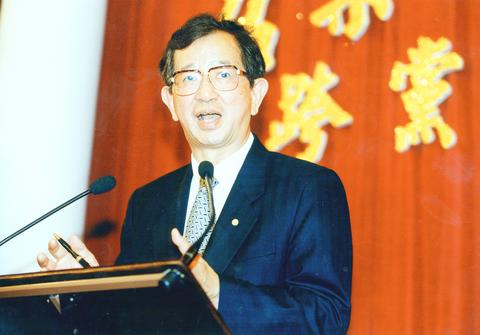Lee Yuan-tseh (李遠哲), leader of Academia Sinica, will represent President Chen Shui-bian (陳水扁) at the APEC leaders' summit later this month. The Presidential Office is expected to make the announcement today.
President Chen yesterday told reporters that he had received an invitation delivered by an envoy dispatched by Mexican President Vincente Fox, the host of the APEC meeting this year.

TAIPEI TIMES FILE PHOTO
A close aide to the president confirmed the invitation was addressed directly to Lee, which indicated that the candidate had already gained permission from the host country.
The 10th APEC leaders' summit will be held on Oct. 26 and Oct. 27 in Los Cabos, Mexico. Lee will sit next to US President George W. Bush.
Along with China and Hong Kong, Taiwan was admitted to the 21-member economic grouping in 1991 under the name "Chinese Taipei."
According to a memorandum of understanding signed in 1991, only economic decision-makers can attend the leadership gathering.
Since the meeting of APEC leaders in 1993 in Seattle, Beijing has pressured the conference's organizers to refuse to let Taiwan's president, vice president, premier or vice premier represent the country at the group's annual summits.
The presidential aide said that in choosing Lee as the candidate, the president was considering his image, international reputation and his command of English.
Lee is a 1986 Nobel laureate in chemistry and the president of the country's highest research institution.
Chen intended to appoint Lee to represent him at the APEC unofficial leaders' summit two years ago, but the arrangement was called off because of opposition from China as a result of Lee's endorsement of Chen during the presidential campaign.
But China seems to have eased its hostility toward Lee after letting him make a visit to Beijing in June, when Lee attended an international academic conference in the city after being refused a visa to enter China for the past two years.
APEC was initially designed as an economic forum when it was launched in 1989, but political issues usually steal the limelight.
Last year Taiwan was forced to be absent from the leader's summit as China, the host country, refused to extend an invitation to former vice president Li Yuan-tzu (李元簇), who was Chen's choice for Taiwan's representative at the meeting.
Although China did not explain its behavior, it was widely believed that Beijing considered Li's former position as vice president unsuitable.
Taiwan's absence from the meeting provoked an outcry from the pro-China opposition camp and triggered concern from other APEC members.
Having learned from past experience, the administration has been particularly circumspect in choosing Chens envoy this year. Officials have said that Lee's status as an academic also helps avoid the complications that a political figure would create.
Nevertheless, Taiwan is apprehensive that China may utilize its diplomatic advantage to pressure the host country -- as happens in almost all APEC meets -- to demote Taiwan's status.

The US government has signed defense cooperation agreements with Japan and the Philippines to boost the deterrence capabilities of countries in the first island chain, a report by the National Security Bureau (NSB) showed. The main countries on the first island chain include the two nations and Taiwan. The bureau is to present the report at a meeting of the legislature’s Foreign Affairs and National Defense Committee tomorrow. The US military has deployed Typhon missile systems to Japan’s Yamaguchi Prefecture and Zambales province in the Philippines during their joint military exercises. It has also installed NMESIS anti-ship systems in Japan’s Okinawa

‘WIN-WIN’: The Philippines, and central and eastern European countries are important potential drone cooperation partners, Minister of Foreign Affairs Lin Chia-lung said Minister of Foreign Affairs Lin Chia-lung (林佳龍) in an interview published yesterday confirmed that there are joint ventures between Taiwan and Poland in the drone industry. Lin made the remark in an exclusive interview with the Chinese-language Liberty Times (the Taipei Times’ sister paper). The government-backed Taiwan Excellence Drone International Business Opportunities Alliance and the Polish Chamber of Unmanned Systems on Wednesday last week signed a memorandum of understanding in Poland to develop a “non-China” supply chain for drones and work together on key technologies. Asked if Taiwan prioritized Poland among central and eastern European countries in drone collaboration, Lin

Renewed border fighting between Thailand and Cambodia showed no signs of abating yesterday, leaving hundreds of thousands of displaced people in both countries living in strained conditions as more flooded into temporary shelters. Reporters on the Thai side of the border heard sounds of outgoing, indirect fire yesterday. About 400,000 people have been evacuated from affected areas in Thailand and about 700 schools closed while fighting was ongoing in four border provinces, said Thai Rear Admiral Surasant Kongsiri, a spokesman for the military. Cambodia evacuated more than 127,000 villagers and closed hundreds of schools, the Thai Ministry of Defense said. Thailand’s military announced that

CABINET APPROVAL: People seeking assisted reproduction must be assessed to determine whether they would be adequate parents, the planned changes say Proposed amendments to the Assisted Reproduction Act (人工生殖法) advanced yesterday by the Executive Yuan would grant married lesbian couples and single women access to legal assisted reproductive services. The proposed revisions are “based on the fundamental principle of respecting women’s reproductive autonomy,” Cabinet spokesperson Michelle Lee (李慧芝) quoted Vice Premier Cheng Li-chiun (鄭麗君), who presided over a Cabinet meeting earlier yesterday, as saying at the briefing. The draft amendment would be submitted to the legislature for review. The Ministry of Health and Welfare, which proposed the amendments, said that experts on children’s rights, gender equality, law and medicine attended cross-disciplinary meetings, adding that